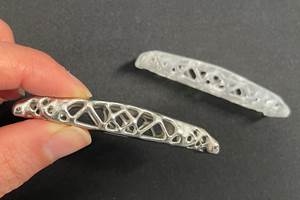Order in the Courts
Tort reform needed so manufacturers can grow, investment can come here.
We’ve all heard the stories about the lady who sued and won millions from the fast-food restaurant because she spilled hot coffee in her lap at the drive-through and—gasp—was burned. Or the woman who sued a store and won thousands because she fell over her toddler who was running through the aisles and behaving like, well, a toddler.
We chuckle at these insane examples of the U.S. legal system. But the laughing stops when it affects pocketbooks of American workers whose companies may be forced out of business or—worse yet—never even opened, due to the high cost of litigation that has swept our nation in recent years.
I came to this conclusion standing in the middle of a convention center in Stuttgart, Germany, in October, admiring equipment at the parts2clean show, an event that attracts nearly all large European manufacturers of parts cleaning equipment and machines.
“Come to the U.S.?” the president of one German machine maker asked. “Never. No way would I risk my entire company because some idiot got his hand stuck in my equipment because he couldn’t follow simple rules.”
Now before we go down this road too far, let’s agree that probably a great majority of product liability and class action lawsuits are warranted. People do get injured or killed by defective equipment, some of which is known by the manufacturer who decided not to make the necessary changes to fix the problem.
People who are legitimately injured deserve to be compensated and their families made whole; make no mistake on which side of the fence we come down on.
But the U.S. Chamber of Commerce and other national business and manufacturing groups know full well that unless there is some type of tort reform in the U.S.—namely a way to reel in lawyers who will file lawsuits at the smallest hint of a possible settlement and clog the court system—then the problem will only get worse and overseas manufacturers will never eye the U.S. for expansion and job creation.
Here’s a reality check: The USCOC says the U.S. has the highest liability costs as a percentage of GDP of the countries surveyed, with liability costs at 2.6 times the average level of the Eurozone economies.
The U.S. has a liability cost that is 1.66 percent of GDP; Germany has a liability cost that is 0.68 of GDP. The Eurozone as a whole has a cost that is 0.63 of GDP.
“The cost of general liability insurance depends upon the amount of coverage purchased and the risk exposure of the particular insured across all of its countries of operation,” says David McKnight, who along with Paul Hinton, runs NERA Economic Consulting and put together the study for the USCOC.
“Simply put, litigation costs affect the ability of companies to compete and prosper,” he says.
A study by the Pacific Research Institute on tort liability laws found that in the 10 years from 1996 through 2005, more than 135 million civil lawsuits were filed in U.S. state courts, or roughly an average of 52,000 new cases every business day.
The cost to business and citizens are measurable. According to Tillinghast–Towers Perrin, direct U.S. tort costs were $252 billion in 2007, or $835 per person. In contrast, costs were only $102 per person in 1950, when adjusted for inflation.
“The security risk is just too high,” another German company executive told me when I asked her why she wasn’t bringing her ultrasonic cleaning technology to the U.S. “People put their cats in the microwave and then sue the maker of the microwave. It doesn’t make any sense.”
It’s true that most companies will settle their suits before ever going to trial rather than risk class-action status or some other doomsday legal nightmare. That’s the fault of their insurance companies, which want to limit exposure.
Lowering the cost of tort liability would not only allow new technologies and foreign investment into the U.S. (read: more jobs), but it would also allow U.S. companies to take some of the money they are spending on insurance and use it to grow outside the borders.
“The cost of the U.S. tort system is a burden that foreign competitors do not bear. It puts American companies at a disadvantage in global markets,” says Lawrence McQuillan, who did the PRI study. “If lawsuit reform lowered U.S. direct tort costs to levels comparable with those of other countries, it would free huge amounts of productive resources and make U.S. companies more globally competitive.”
Put that in your coffee and drink it. Just be careful the lid is on securely.
Related Content
Nanotechnology Start-up Develops Gold Plating Replacement
Ag-Nano System LLC introduces a new method of electroplating based on golden silver nanoparticles aimed at replacing gold plating used in electrical circuits.
Read MoreLiquid Chrome Vs. Chromic Acid Flake
Contemplating how to continue offering chromic acid services in an increasingly stringent regulatory world? Liquid chrome products may be the solution you’re looking for.
Read MoreAdvantages to Pumped Eductor Agitation
Not all agitation methods are created equally. Pumped agitation with eductor nozzles can improve process tanks and quickly show a reduction in operating costs while keeping staff safe, following environmental legislation and preventing pollution.
Read MorePossibilities From Electroplating 3D Printed Plastic Parts
Adding layers of nickel or copper to 3D printed polymer can impart desired properties such as electrical conductivity, EMI shielding, abrasion resistance and improved strength — approaching and even exceeding 3D printed metal, according to RePliForm.
Read MoreRead Next
Episode 45: An Interview with Chandler Mancuso, MacDermid Envio Solutions
Chandler Mancuso, technical director with MacDermid Envio discusses updating your wastewater treatment system and implementing materials recycling solutions to increase efficiencies, control costs and reduce environmental impact.
Read MoreEducation Bringing Cleaning to Machining
Debuting new speakers and cleaning technology content during this half-day workshop co-located with IMTS 2024.
Read MoreDelivering Increased Benefits to Greenhouse Films
Baystar's Borstar technology is helping customers deliver better, more reliable production methods to greenhouse agriculture.
Read More






.jpg;maxWidth=300;quality=90)















